中考英语易错题以和易混淆单词集锦
- 格式:doc
- 大小:56.00 KB
- 文档页数:10
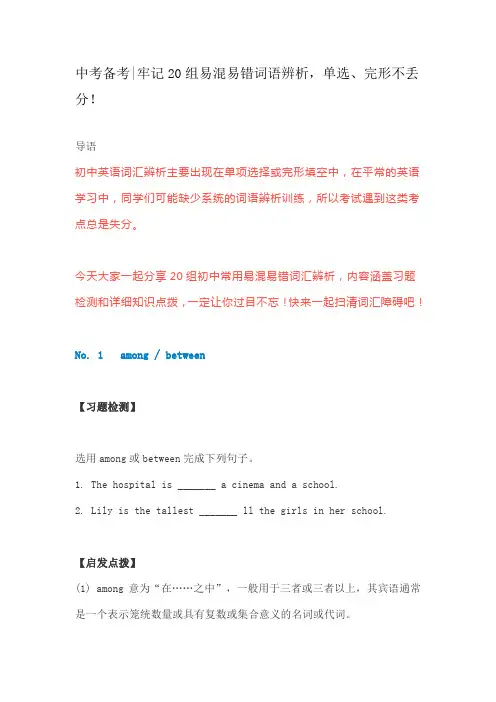
中考备考|牢记20组易混易错词语辨析,单选、完形不丢分!导语初中英语词汇辨析主要出现在单项选择或完形填空中,在平常的英语学习中,同学们可能缺少系统的词语辨析训练,所以考试遇到这类考点总是失分。
今天大家一起分享20组初中常用易混易错词汇辨析,内容涵盖习题检测和详细知识点拨,一定让你过目不忘!快来一起扫清词汇障碍吧!No. 1 among / between【习题检测】选用among或between完成下列句子。
1. The hospital is _______ a cinema and a school.2. Lily is the tallest _______ ll the girls in her school.【启发点拨】(1) among意为“在……之中”,一般用于三者或三者以上,其宾语通常是一个表示笼统数量或具有复数或集合意义的名词或代词。
(2) between一般指两者之间,其宾语通常是表示两者概念的名词或代词,或由and连接的两个具体的人或物。
between有时也可表示多者之中的“两两之间”。
如:Switzerland lies between France, Germany, Austria and Italy.Key:1. between2. amongNo. 2 lay / lie【习题检测】用lay或lie的适当形式完成句子。
1. I _______ the table when my mother cooked the meal.2. John was ill and _______ in bed all morning.【启发点拨】(1) lay作动词,可意为“摆放(餐桌)”,其过去式与过去分词均为laid,现在分词为laying,常用于短语lay the table,意为“摆放餐桌”。
如:Tom was laying the table.(2) lie作动词,意为“躺;平躺”时,过去式为lay,过去分词为lain,现在分词为lying。

易错题以及易混淆单词集锦1. I have a little brother. He is 8-year-old boy.A.anB. a. D. theC./2.This bike repaired.A.is able toB. canC. can beD. is able to be3.This class is about to begin .A. nowB. very soonC. beforeD. just nowPart2.中考重点语法知识1.是形容词,意思为 死了的、无生命的 ,表示状态,可以与一段时间连用。
是动词,意思为 死、死亡 ,是一个瞬间动词,不能与一段时间连用。
是名词,意思为 死亡、去世 等。
是 的现在分词,用作形容词,意思是 垂死的、即将死去的 。
表示的是从别人那里借来东西,即我们通常所说的 借进来 。
是一个瞬间完成的动作,因此不能与时间段连用。
错误错误表示的是把自己的东西借给别人,即我们通常所说的 借出去 。
与 一样,也是一个瞬间完成的 动作,不能与一段时间连用。
的意思也是 借 ,但一般是指借来后的保存或使用阶段,是一段持续的时间,因此可以与时间段连用。
意思是 离开,留下 。
意思是 前往 ,表示要去的目的地。
用于完成时态,既能用作介词,也能用作连词,后常接时间点,意思是 自从 。
作连词,还有 既然 的意思。
既然你对它感兴趣,那就做吧。
用于完成时,用作介词,后常接一段时间,意思是 经过 。
也可以用作连词,但意思是 因为 。
作代词是对两者都进行否定,意思为 两者都不 ,作主语时谓语动词用单数用作形容词,也修饰单数名词,意思与作代词时相同;用作连词时,一般与 搭配,表示 既不 也不 。
作主语时,谓语动词也遵循就近原则。
作代词时,是指两者中的任意一方 两者之 每一个,故作主语时谓语动词用单数作形容词 用来修饰单数名词 意思与作介词时相同作连词时 一般与 搭配 表示两者选其一,意思是 不是 就是 。
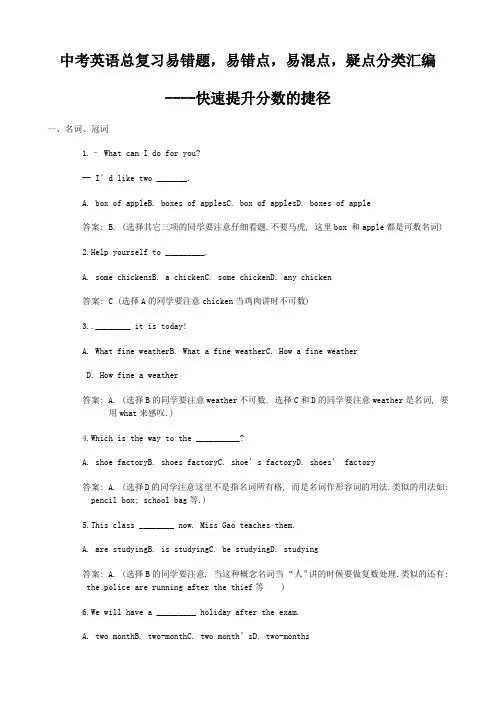
中考英语总复习易错题,易错点,易混点,疑点分类汇编----快速提升分数的捷径一、名词、冠词1.– What can I do for you?-- I’d like two _______.A. box of appleB. boxes of applesC. box of applesD. boxes of apple答案: B. (选择其它三项的同学要注意仔细看题.不要马虎, 这里box 和apple都是可数名词)2.Help yourself to _________.A. some chickensB. a chickenC. some chickenD. any chicken答案: C (选择A的同学要注意chicken当鸡肉讲时不可数)3..________ it is today!A. What fine weatherB. What a fine weatherC. How a fine weatherD. How fine a weather答案: A. (选择B的同学要注意weather不可数. 选择C和D的同学要注意weather是名词, 要用what来感叹.)4.Which is the way to the __________?A. shoe factoryB. shoes factoryC. shoe’s factoryD. shoes’ factory答案: A. (选择D的同学注意这里不是指名词所有格, 而是名词作形容词的用法.类似的用法如: pencil box; school bag等.)5.This class ________ now. Miss Gao teaches them.A. are studyingB. is studyingC. be studyingD. studying答案: A. (选择B的同学要注意, 当这种概念名词当“人”讲的时候要做复数处理.类似的还有: the police are running after the thief等)6.We will have a _________ holiday after the exam.A. two monthB. two-monthC. two month’sD. two-months答案: B (选择C的同学要注意应用two months’; 选择D的同学要注意名词之间有“—“ 后的组合词当作形容词来用, 因此就不用所有格形式了.)7.________ trees are cut down in the forests every year.A. ThousandB. ThousandsC. Thousand ofD. Thousands of答案: D. (选择C的同学注意词组记忆的准确性)8.Our sports meeting will be held ________.A. on 24, Tuesday, AprilB. in April 24, TuesdayC. on Tuesday, April 24D. inApril Tuesday 24答案: C. (选B的同学是受到中文的影响,要特别注意中英文的差异)9_________ people here are very friendly to us.A. TheB. /C. AD. An答案: A. (选择B的同学要注意这里的people是特指这里的, 因此要用定冠词the)10..There is no enough ________ in the corner to put the table.A. placeB. roomC. floorD. ground答案:B (根据句意知道,这里表示没有地方放桌子。
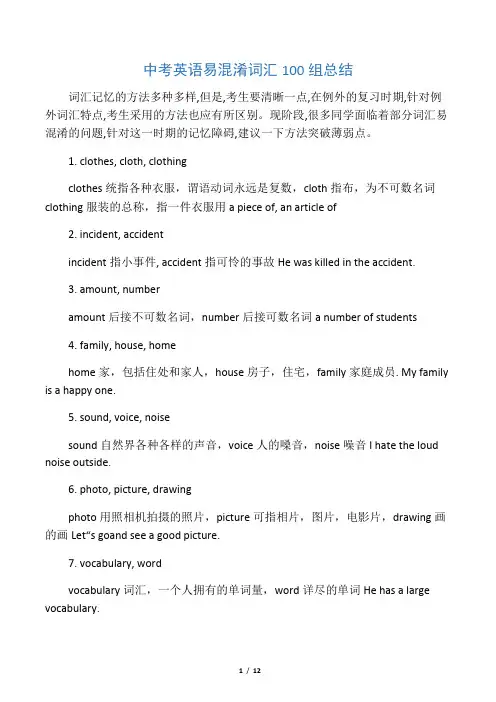
中考英语易混淆词汇100组总结词汇记忆的方法多种多样,但是,考生要清晰一点,在例外的复习时期,针对例外词汇特点,考生采用的方法也应有所区别。
现阶段,很多同学面临着部分词汇易混淆的问题,针对这一时期的记忆障碍,建议一下方法突破薄弱点。
1. clothes, cloth, clothingclothes统指各种衣服,谓语动词永远是复数,cloth指布,为不可数名词clothing服装的总称,指一件衣服用a piece of, an article of2. incident, accidentincident指小事件, accident指可怜的事故He was killed in the accident.3. amount, numberamount后接不可数名词,number后接可数名词a number of students4. family, house, homehome家,包括住处和家人,house房子,住宅,family家庭成员. My family is a happy one.5. sound, voice, noisesound自然界各种各样的声音,voice人的嗓音,noise噪音I hate the loud noise outside.6. photo, picture, drawingphoto用照相机拍摄的照片,picture可指相片,图片,电影片,drawing画的画Let“s goand see a good picture.7. vocabulary, wordvocabulary词汇,一个人拥有的单词量,word详尽的单词He has a large vocabulary.8. population, peoplepopulation人口,人数,people详尽的人China has a large population.9. weather, climateweather一天内详尽的天气状况,climate长期的气候状况The climate here is not good foryou.10. road, street, path, wayroad详尽的公路,马路,street街道,path小路,小径,way道路,途径take this road; in the street, show me the way to the museum.11. course, subjectcourse课程(可包括多门科目),subject科目(详尽的学科)a summer course12. custom, habitcustom传统风俗,习俗,也可指生活习惯,后接to do,habit生活习惯,习惯成自然,后接of doing. I“ve got the habit of drinking a lot.13. cause, reasoncause指造成某一事实或现象的直接原因,后接of sth./doing sth,reason用来解释某种现象或结果的理由,后接for sth./doing sth. the reason for being late14. exercise, exercises, practiceexercise运动,锻炼(不可数),exercises练习(可数),practice(反复做的)练习Practicemakes perfect.15. class, lesson作“课“解时,两者可以替换.指课文用lesson.指班级或全体学生用class. lesson 6; class 516. speech, talk, lecturespeech指在公共场所所做的经过准备的较正式的演说,talk日常生活中的大凡的谈话,讲话,lecture学术性的演讲,讲课a series of lecture on…17. officer, officialofficer部队的军官,official政府官员an army officer18. work, job二者均指工作。
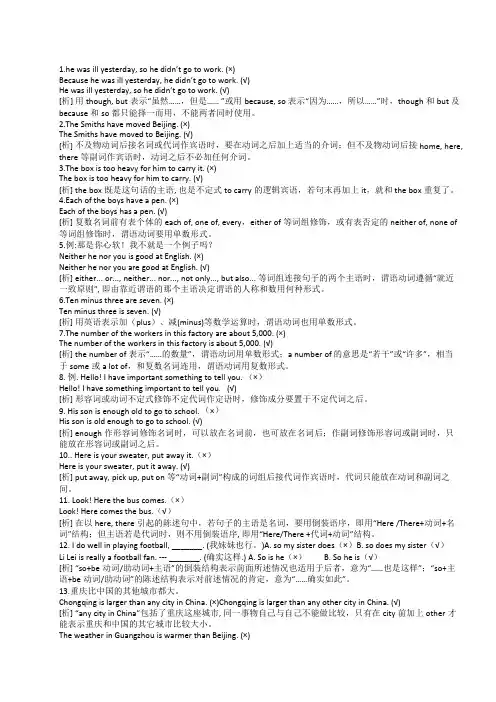
1.he was ill yesterday,so he didn’t go to work.(×)Because he was ill yesterday,he didn’t go to work.(√)He was ill yesterday,so he didn’t go to work.(√)[析]用though,but表示“虽然……,但是……”或用because,so表示“因为……,所以……”时,though和but及because和so都只能择一而用,不能两者同时使用。
2.The Smiths have moved Beijing.(×)The Smiths have moved to Beijing.(√)[析]不及物动词后接名词或代词作宾语时,要在动词之后加上适当的介词;但不及物动词后接home,here, there等副词作宾语时,动词之后不必加任何介词。
3.The box is too heavy for him to carry it.(×)The box is too heavy for him to carry.(√)[析]the box既是这句话的主语,也是不定式to carry的逻辑宾语,若句末再加上it,就和the box重复了。
4.Each of the boys have a pen.(×)Each of the boys has a pen.(√)[析]复数名词前有表个体的each of,one of,every,either of等词组修饰,或有表否定的neither of,none of 等词组修饰时,谓语动词要用单数形式。
5.例:那是你心软!我不就是一个例子吗?Neither he nor you is good at English.(×)Neither he nor you are good at English.(√)[析]either...or...,neither...nor...,not only...,but also...等词组连接句子的两个主语时,谓语动词遵循“就近一致原则”,即由靠近谓语的那个主语决定谓语的人称和数用何种形式。
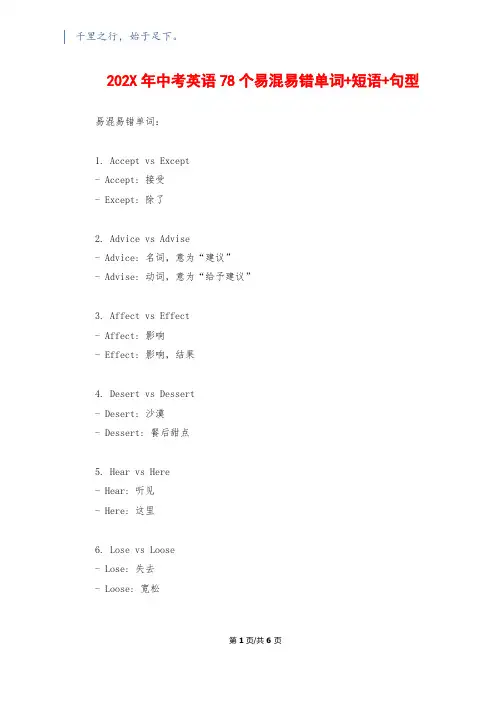
202X年中考英语78个易混易错单词+短语+句型易混易错单词:1. Accept vs Except- Accept: 接受- Except: 除了2. Advice vs Advise- Advice: 名词,意为“建议”- Advise: 动词,意为“给予建议”3. Affect vs Effect- Affect: 影响- Effect: 影响,结果4. Desert vs Dessert- Desert: 沙漠- Dessert: 餐后甜点5. Hear vs Here- Hear: 听见- Here: 这里6. Lose vs Loose- Lose: 失去- Loose: 宽松第1页/共6页7. Weather vs Whether- Weather: 天气- Whether: 是否8. Quiet vs Quite- Quiet: 安静- Quite: 相当9. Principal vs Principle- Principal: 校长- Principle: 原则10. Stationary vs Stationery - Stationary: 静止的- Stationery: 文具11. Than vs Then- Than: 比如- Then: 然后12. Their vs There vs They're - Their: 他们的- There: 那里- They're: they are(他们是)13. Threw vs Through- Threw: 扔- Through: 穿过14. To vs Too- Too: 也,过于15. Its vs It's- Its: 它的- It's: it is(它是)16. Your vs You're- Your: 你的- You're: you are(你是)17. Principal vs Principle- Principal: 校长- Principle: 原则18. Heel vs Heal- Heel: 脚后跟- Heal: 治愈19. Cement vs Concrete- Cement: 水泥- Concrete: 混凝土20. Idle vs Idol- Idle: 闲置的- Idol: 偶像21. Cell vs Sell- Cell: 细胞第3页/共6页22. Fare vs Fair- Fare: 费用- Fair: 公平的23. Foul vs Fowl- Foul: 犯规的- Fowl: 家禽24. Peak vs Peek vs Pique- Peak: 顶峰- Peek: 偷看- Pique: 激怒25. Breath vs Breathe- Breath: 呼吸(名词)- Breathe: 呼吸(动词)易混易错短语:1. By the way vs Anyway- By the way: 顺便问一下- Anyway: 无论如何2. In the meantime vs Meanwhile- In the meantime: 与此同时- Meanwhile: 与此同时3. On the other hand vs On the one hand- On the other hand: 另一方面- On the one hand: 一方面4. It's all Greek to me- 意为“对我来说这都是希腊文”,表示完全听不懂5. Fit as a fiddle- 意为“身体非常健康”6. Break a leg- 意为“祝你好运”7. A piece of cake- 意为“易如反掌”8. Once in a blue moon- 意为“千载难逢”9. Bite the bullet- 意为“咬紧牙关”10. Keep your fingers crossed- 意为“祝你好运”易混易错句型:1. I have been to New York last year.- I went to New York last year.第5页/共6页2. She didn't went to school yesterday.- She didn't go to school yesterday.3. Have you ever been to Paris?- Have you ever been to Paris before?4. I don't know nothing about that.- I don't know anything about that.5. He was tired, so he gone to bed early. - He was tired, so he went to bed early.6. I have lived in this city since 5 years. - I have lived in this city for 5 years.7. I am here for visit my grandparents.- I am here to visit my grandparents.8. We don't have no time for that.- We don't have any time for that.。
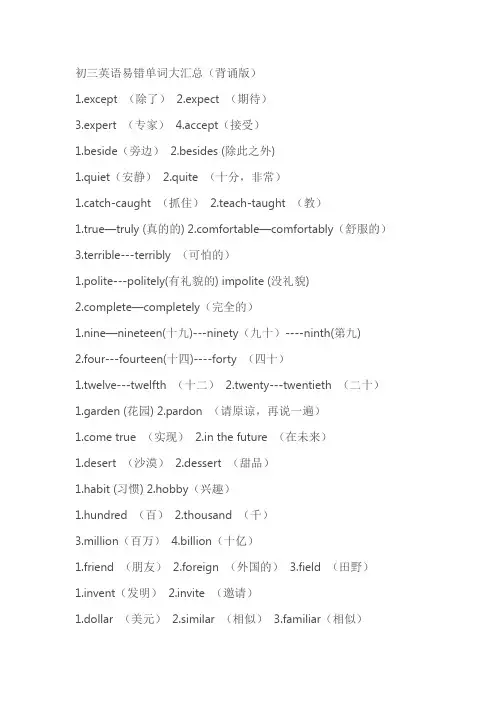
初三英语易错单词大汇总(背诵版)1.except (除了)2.expect (期待)3.expert (专家)4.accept(接受)1.beside(旁边)2.besides (除此之外)1.quiet(安静)2.quite (十分,非常)1.catch-caught (抓住)2.teach-taught (教)1.true—truly (真的的)fortable—comfortably(舒服的)3.terrible---terribly (可怕的)1.polite---politely(有礼貌的) impolite (没礼貌)plete—completely(完全的)1.nine—nineteen(十九)---ninety(九十)----ninth(第九)2.four---fourteen(十四)----forty (四十)1.twelve---twelfth (十二)2.twenty---twentieth (二十)1.garden (花园) 2.pardon (请原谅,再说一遍)e true (实现)2.in the future (在未来)1.desert (沙漠)2.dessert (甜品)1.habit (习惯)2.hobby(兴趣)1.hundred (百)2.thousand (千)lion(百万)4.billion(十亿)1.friend (朋友)2.foreign (外国的)3.field (田野)1.invent(发明)2.invite (邀请)1.dollar (美元)2.similar (相似)3.familiar(相似)1.though = although (尽管)2.through (通过)3.thought(think的过去式)1.throw ---threw---thrown (扔)2.lie----lay----lain(躺,位于)3.lie---lied ---lied(说谎)y ---laid----laid (放,产卵)1.till (直到)2.not-----until(直到-----才)3.unless (除非)1.argue(争吵,动词)---argument(争吵,名词)1.delicious (美味的)2.travel (旅行)3.thief--thieves (小偷)1.one---first (第一)2.three –third (第三)3.girls (女孩)1.mouth(嘴巴)2.month----months (月份)3.mouse—mice (老鼠) 1.plan---planned (双写)2.prefer----preferred (双写)3.stop-stopped(双写)1.eat---eating(不双写)2.rain---raining(不双写)3.wait-waiting(不双写)4.happen----happened 、happening(不双写)5.write-wrote-written(双写)-writing(不双写)1.expensive----inexpensive2.like ---dislike(不喜欢) ----unlike(不像)1.honest---dishonest(不诚实)2.appear---disappear(消失)1. modern (现代化的)2.model(模型)1.medicine (药)2.machine(机器)1.pride (骄傲,名词)2.proud (自豪的,形容词)3.pound (英镑)1.weather (天气)2.whether(是否)1.father(父亲)2.farther (far的比较级,更远的)3.further(进一步,更深入)1.believe (相信)2.receive (收到)1. succeed (成功,动词)-----success(名词)-successful(形容词) 1.before (之前)2.pass (动词通过)3.past(介词,经过一般用于动词后,如:walk past)初三英语易错单词大汇总(默写版)1_________ (除了)2.__________(期待)3. _________(专家)4. _________(接受)1. _________(旁边)2. _________ (除此之外)1. _________(安静)2. _________ (十分,非常)1.catch-_________ 过去式(抓住)2.teach-_________过去式(教)1.true—_________ 副词(真的)fortable—_________(舒服的)3.terrible---_________ (可怕的)1.polite--_________ (有礼貌的) _________ (没礼貌)plete—_________(完全的)1.nine—_________ (十九)-- _________(九十)--_________ (第九)2.four--_________ (十四)-- _________(四十)1.twelve---_________(十二)2.twenty---_________ (二十)1. _________ (花园)2. _________(请原谅,再说一遍)e _________ (实现)2.in the_________ (在未来)1. _________ (沙漠)2. _________(甜品)1. _________ (习惯)2. _________(兴趣)1. _________ (百)2. _________(千)3. _________(百万)4. _________(十亿)1. _________ (朋友)2. _________(外国的)3. _________(田野)1. _________(发明)2. _________(邀请)1. _________(美元)2. _________(相似)3. _________(相似)1. _________ = _________(尽管)2. _________(通过)3. _________(think的过去式)1.throw --________ --________ (扔)2.lie---_______ -______ (躺,位于)3. lie--______ --______(说谎)y --________ --________(放,产卵)1. _________ (直到)2._________(直到-----才)3. _________(除非)1. _________(争吵,动词)---_________争吵,名词)1. _________ (美味的)2. _________ (旅行)3.thief--_________ (小偷)1.one--_________ (第一)2.three –_________ (第三)3. _________(女孩)1. _________ (嘴巴)2.month---_________ (月份)3.mouse—_________ (老鼠)1.plan---_________ 过去式(双写)2.prefer----_________(双写)3.stop-_________(双写)1.eat--_________现在分词(不双写)2.rain---_________(不双写)3.wait-_________(不双写)4.happen----_________、_________(不双写)1.expensive----________(不贵的)2.like --________ (不喜欢) ----________(不像)1.honest---________(不诚实)2.appear---________ (消失)1. ________(现代化的)2. ________(模型)1. ________ (药)2. ________(机器)1. ________(骄傲,名词)2. ________(自豪的,形容词)3. ________(英镑)1. ________(天气)2. ________(是否)1. ________(父亲)2. ________(far的比较级,更远的)3.________(far的比较级,进一步,更深入)1. ________(相信)2. ________(收到)1. ________ (成功,动词)--- ________(名词)-________ (形容词)1. ________(之前)2. ________ (动词通过)3. ________(介词,经过,一般用于动词后,如:______走过)易错首字母强化训练:1.There are many different kinds of flowers in the g_________.2.Our parents t_________ care for us. They always prepare everything what we need in advance.3.I took lots of wonderful photos with my new c__________.4.E__________ is the mother of wisdom.5.A__________speaks louder than words.6.I beg your ________. What do you mean7.There are so many things around us that go against our w________. We should believe in ourselves and keep on fighting.8.You are supposed to fini sh your homework b________ ten o’clock.9.I used to sit b_________ my mother and enjoyed the stories when I was young.10.Mary can speak three f_________ languages, such as Chinese, French, and German.11.I can’t stand the w________ here, it’s so hot and h umid.12.You’d better change your bad eating h__________. Don’t eat too much fat.13.Today is my t____________ birthday. So eleven candles is not enough , I still need one more.14.The thief was c___________ by the police three years later. And put him into the prison.15.Look , the students are w__________ for the bus. The bus was fiveminutes later than usual.16.Please show me the m_______ plane, It’s quite special, I’m really interested in it.17.My grandma began to learn English in her f________---nearly fifty years old.18.I p_________to go Hongkong for my holiday, but now I have changed my mind. I will go to Thailand instead.19.There are f_______ days in two weeks.20.The people who have realized their mistakes should be e________. 参考答案:1.garden2.truly3.camera4.Experience5.Action6.pardon7.will 8.by/before 9.beside 10.foreign 11.weather 12.habit13.twelfth 14.caught 15.waiting 16.model 17.forties 18.planned 19.fourteen 20.excused。
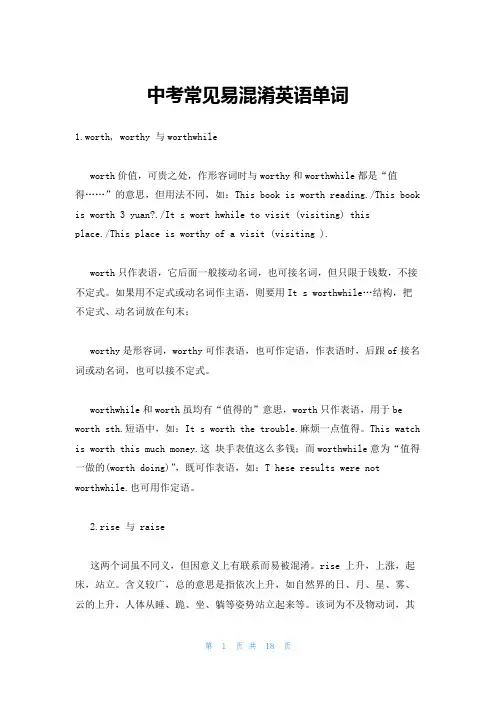
中考常见易混淆英语单词1.worth, worthy 与worthwhileworth价值,可贵之处,作形容词时与worthy和worthwhile都是“值得……”的意思,但用法不同,如:This book is worth reading./This book is worth 3 yuan?./It s wort hwhile to visit (visiting) thisplace./This place is worthy of a visit (visiting ).worth只作表语,它后面一般接动名词,也可接名词,但只限于钱数,不接不定式。
如果用不定式或动名词作主语,则要用It s worthwhile…结构,把不定式、动名词放在句末;worthy是形容词,worthy可作表语,也可作定语,作表语时,后跟of接名词或动名词,也可以接不定式。
worthwhile和worth虽均有“值得的”意思,worth只作表语,用于be worth sth.短语中,如:It s worth the trouble.麻烦一点值得。
This watch is worth this much money.这块手表值这么多钱;而worthwhile意为“值得一做的(worth doing)”,既可作表语,如:T hese results were not worthwhile.也可用作定语。
2.rise 与 raise这两个词虽不同义,但因意义上有联系而易被混淆。
rise 上升,上涨,起床,站立。
含义较广,总的意思是指依次上升,如自然界的日、月、星、雾、云的上升,人体从睡、跪、坐、躺等姿势站立起来等。
该词为不及物动词,其过去式与过去分词分别是rose 和 risen。
例如:The sun rises in the east and sets in the west.日出于东而落于西。
/ Prices rise every day in those countries.那些国家里的物价天天上涨。
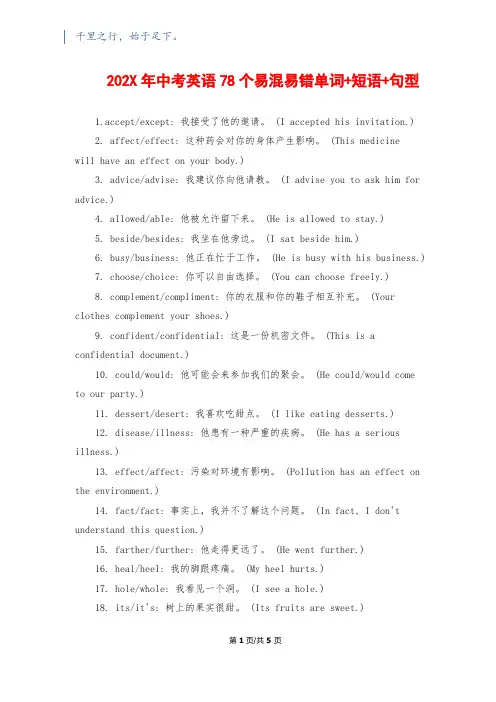
202X年中考英语78个易混易错单词+短语+句型1.accept/except: 我接受了他的邀请。
(I accepted his invitation.)2. affect/effect: 这种药会对你的身体产生影响。
(This medicinewill have an effect on your body.)3. advice/advise: 我建议你向他请教。
(I advise you to ask him for advice.)4. allowed/able: 他被允许留下来。
(He is allowed to stay.)5. beside/besides: 我坐在他旁边。
(I sat beside him.)6. busy/business: 他正在忙于工作。
(He is busy with his business.)7. choose/choice: 你可以自由选择。
(You can choose freely.)8. complement/compliment: 你的衣服和你的鞋子相互补充。
(Your clothes complement your shoes.)9. confident/confidential: 这是一份机密文件。
(This is a confidential document.)10. could/would: 他可能会来参加我们的聚会。
(He could/would cometo our party.)11. dessert/desert: 我喜欢吃甜点。
(I like eating desserts.)12. disease/illness: 他患有一种严重的疾病。
(He has a serious illness.)13. effect/affect: 污染对环境有影响。
(Pollution has an effect on the environment.)14. fact/fact: 事实上,我并不了解这个问题。
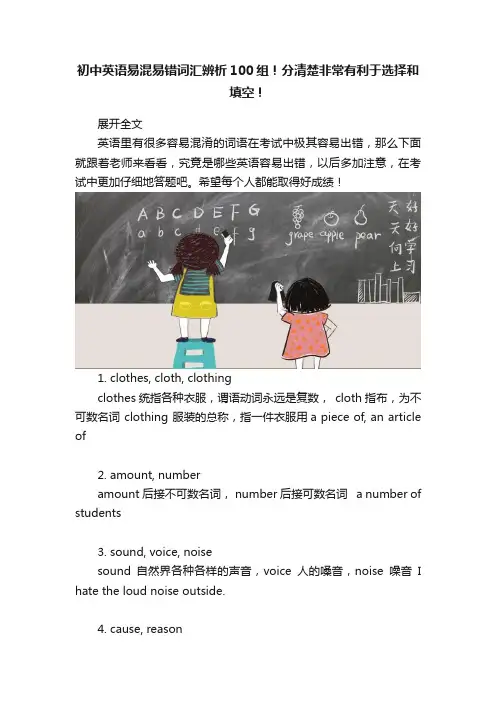
初中英语易混易错词汇辨析100组!分清楚非常有利于选择和填空!展开全文英语里有很多容易混淆的词语在考试中极其容易出错,那么下面就跟着老师来看看,究竟是哪些英语容易出错,以后多加注意,在考试中更加仔细地答题吧。
希望每个人都能取得好成绩!1. clothes, cloth, clothingclothes统指各种衣服,谓语动词永远是复数,cloth指布,为不可数名词 clothing 服装的总称,指一件衣服用a piece of, an article of2. amount, numberamount后接不可数名词, number后接可数名词 a number of students3. sound, voice, noisesound自然界各种各样的声音,voice人的嗓音,noise噪音I hate the loud noise outside.4. cause, reasoncause 指造成某一事实或现象的直接原因,后接of sth./doing sth,reason用来解释某种现象或结果的理由,后接for sth./doing sth. the reason for being late5. exercise, exercises, practiceexercise运动,锻炼(不可数),exercises练习(可数),practice(反复做的)练习 Practice makes perfect.6. officer, officialofficer部队的军官,official政府官员 an army officer7. work, job二者均指工作。
work不可数,job可数 a good job8. cook, cookercook厨师,cooker厨具 He is a good cook.9. problem, questionproblem常和困难连系,前面的动词常为think about, solve, raise,question常和疑问连系,多和ask, answer连用10. a number of, the number ofa number of许多,谓语动词用复数。
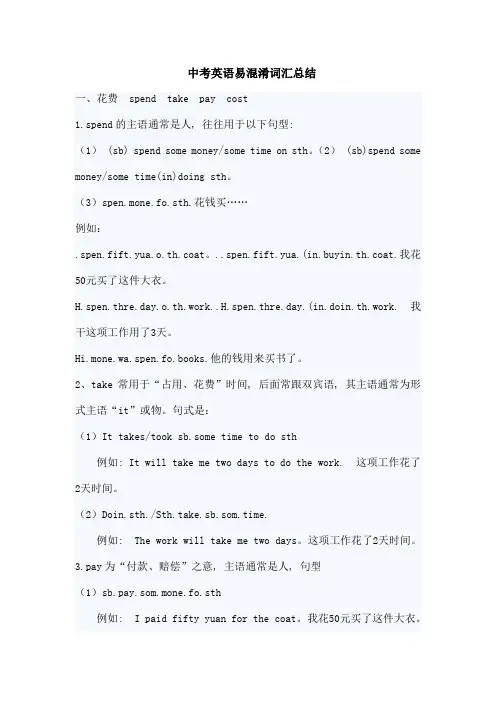
中考英语易混淆词汇总结一、花费 spend take pay cost1.spend的主语通常是人, 往往用于以下句型:(1) (sb) spend some money/some time on sth。
(2) (sb)spend some money/some time(in)doing sth。
(3)spen.mone.fo.sth.花钱买……例如:.spen.fift.yua.o.th.coat。
..spen.fift.yua.(in.buyin.th.coat.我花50元买了这件大衣。
H.spen.thre.day.o.th.work..H.spen.thre.day.(in.doin.th.work.我干这项工作用了3天。
Hi.mone.wa.spen.fo.books.他的钱用来买书了。
2、take常用于“占用、花费”时间, 后面常跟双宾语, 其主语通常为形式主语“it”或物。
句式是:(1)It takes/took sb.some time to do sth例如: It will take me two days to do the work. 这项工作花了2天时间。
(2)Doin.sth./Sth.take.sb.som.time.例如: The work will take me two days。
这项工作花了2天时间。
3.pay为“付款、赔偿”之意, 主语通常是人, 句型(1)sb.pay.som.mone.fo.sth例如: I paid fifty yuan for the coat。
我花50元买了这件大衣。
(2)pa.(sb..mone.fo.sth.付钱(给某人)买……。
例如:.hav.t.pa.the.2.pound.fo.thi.roo.eac.month.我每个月要付20英磅的房租。
(3)pay money back 还钱。
(4)例如: Ma..borro.1.yua.fro.yo.I'l.pa.i.bac.nex.week.你能借给我12块钱吗?下周还你。
中考英语听力考试容易混淆的50个词语中考英语听力考试容易混淆的50个词语中考英语听力容易混淆的50个词语听力考试时间宝贵,许多有用的信息稍纵即逝,最令人遗憾的莫过于听到一个自己摸棱两可的词或短语了,比如in a way和in the way,feel for sb.和feel for sth,通常会令我们举棋不定。
因此,在平日的训练当中,多多加强这些容易混淆的词语和短语的练习是十分有必要的,我们将分三次就一些易错的词语和表达法进行讲解,并附有例句,供大家加深理解。
1) a big time:尽兴,高兴的时刻e.g. I had a big time there.the big time:第一流,最高级e.g. Don’t worry, you are in the big time now.2) according to:按照,根据e.g. They were commended or criticized according to their work.according as:随……而定e.g. The thermometer rises or falls according as the air is hot or cold.3) admit to:承认e.g. I have to admit to a dislike for modern music.admit sb.(in) to:允许某人进入某地或加入某组织、行业e.g. They have admitted me into their club.4) all for:完全赞成e.g. I am all for holding a meeting to discuss it.for all:尽管e.g. They could not open the box for all their forces.5) all in all:总的说来e.g. All in all, it is a success.xall in:疲倦,筋疲力尽e.g. He was all in, but he stuck it out.6) as it is (was):照目前的.情况来看e.g. As it is, we shall be able to complete our task in time.as it were:可以说,姑且这样说e.g. He is, as it were, a walking dictionary.7) as much as:几乎,实际上e.g. By running away he as much as admitted that he had taken the money.as much…as:与……一样多e.g. It is as much our responsibility as yours.8) as well:也,还是……为好e.g. He gave me advice, and money as well.Since you have begun to do it, you may as well finish it.as well as:不仅……而且,除……之外e.g. With television, we see a picture as well as hearing sound.Small towns as well as big cities are being rapidly industrialized.9) at one time从前某个时期e.g. At one time, we met frequently.at a time:每次,一次e.g. You can borrow only two books at a time.10) attach to:属于,归因于e.g. No blame attaches to him.attach oneself to:参加,加入e.g. He attached himself to the group of climbers.11) be a credit to:为……增光e.g. I hope you will be a credit to your school.do credit to:为……增进荣誉e.g. This piece of work does credit to you.x12) bear in mind:记住e.g. I hope you will bear in mind all I am saying.have in mind:考虑e.g. Don’t give your confidence to others regarding the plan you have in mind.13) begin with:以……为起点e.g. He advised me to begin with something easy.to begin with:首先e.g. To begin with, we must consider the problem from all sides.14) build up:逐步建成,增强e.g. They are trying hard to build up an independent economy.He went for an ocean voyage and built up his health.build on:以……为基础,依赖e.g. Let’s build on your idea.We shall build on your supporting us.15) by day:在白天e.g. Most of them work by day and study by night.by the day:(指工作报酬等)按日计算e.g. Will you pay me by the day or by the hour?16) can but只好……罢了e.g. We can but try to make him see how unreasonable he has been.cannot but:不得不,禁不住e.g. I cannot but tell her the truth.(=I cannot help telling her the truth)17) come forth:出现,发行e.g. Many new things are coming forth..Do you know that a set of new stamps has come forth?come forward:自告奋勇,提出供讨论They have come forward with an offer to help.18)compare … to比拟(指出其中的相似点)e.g. Man’s life is often compared to a candle.compare … with:把……和……相比(指出其不同之处)e.g. He compared his camera with mine.19) consist in:包含在……中e.g. Happiness consists in good health.consist of:由……组成e.g. The apartment consisted of two rooms and a kitchen.20) end on:两端相碰,正对e.g. The two ships collided each other end on.We shouldn’t place the bicycles end on.on end:竖着,连续地,不断地e.g. Place the box on end.She often works for 20 hours on end.21) familiar to:某事为某人熟知e.g. There were facts not familiar to me.familiar with:熟悉或通晓某事e.g. He is familiar with English, German and French..22) feel for sb.:同情某人,为某人难过e.g. I feel for you in your sorrow.feel for sth:(用手、脚、棍子等)摸索,寻找某物e.g. She felt under the pillow for her watch.23) for a moment:片刻,一会儿e.g. She was silent for a moment, weighing in her mind the pros and cons.for the moment:此刻、暂时e.g. I cannot recall his name for the moment.24) get down:下去,下来;写下来Here’s the telephone number I got down for you.get down to:认真着手进行处理e.g. It is no good shirking the job, it will have to be got down to.25) get into trouble with sb.:遭到某人的(训斥等)e.g. Poor Tom is always getting into trouble with the boss.get sb. into trouble:使某人陷入困境e.g. The letter got me into trouble.26) give sb. a hand:帮助某人或参与某人做某事e.g. Give me a hand with the cleaning, please.give sb. one’s hand:与某人握手e.g. She gave me her hand and wished me a good trip.27) go through:检查,搜查;通过,穿过e.g. They went through our luggage at the customs.It took us a whole week to go through the great forest.go through with:把……坚持到底e.g. We should go through with the experiment now we’ve started.28) good for:有益于e.g. This book is good for your English study.for good:永久地e.g. The lost money was gone for good.29) have a fancy for:爱好,喜爱e.g. She has a fancy for nice clothes.have a fancy that:猜想,认为e.g. I have a fancy that he will come tonight.30) head up:领头;领导e.g. A band headed up the parade.Mr. Jones will head up the new business.e.g. Heads up, now! You can do better than that.31) in a way:在某种程度上e.g. In a way, it is an important book.in the way:妨碍,挡路I will visit you next weekend if there is nothing in the way.32) in black:穿黑色衣服e.g. Arabian women are always dressed in black clothes.in the black:赢利,赚钱New production methods put the company in the black.33) in charge of:负责e.g. Who is in charge of this work?in the charge of:照护e.g. The patients are in the charge of the nurse.34) in hand:控制e.g. There was a little rioting, but the police soon had the situation in hand.hand in:递交,交给e.g. He handed in his resignation in protest against it.35) in one’s honor:向……表示敬意或感谢e.g. The day was kept as a holiday in honor of victory.on one’s honor:用人格担保e.g. We were on our honor not to cheat on the exam.36) in possession of:占有e.g. He is in possession of this house.in the possession of:被占有e.g. The keys are in the possession of the door keeper.37) in spirit:在内心,在精神上e.g. In spirit, at least, these laws were very fair.in spirits:情绪或心情(好、坏等)e.g. He is in poor spirits because of his failing in the exam.38) keep up:继续,保持e.g. They entered into a correspondence which was kept upfor almost ten years.keep up with:与……齐步前进,跟上e.g. With their help, he has kept up with the class.39) look about:环视e.g. He looked about him with great interest.look about for:四处寻找e.g. She was looking about for the key she had just lost.40) look up:向上看e.g. He looked up and nodded to me.look up to:尊敬e.g. It must be rewarding to be looked up to by so many people.41) make one’s way:开路e.g. As soon as he saw us, the teacher made his way through the crowd to greet us.make one’s way to:向……走去e.g. In the evening we made our way to the appointed meeting place.42) measure to:测量到某一精度e.g. Measure this part to mm.measure up to:够得上,可以匹敌e.g. The new techniques measure up to advanced world standard.43) more than:很,非常e.g. He was more than upset by the accident.more…than:比……更e.g. I regarded her more highly than me.44) much as:虽然xe.g. Much as I should like to go, I can’t go right now.as much:同样的或同样多少的e.g. You have always helped me and I will always do as much for you.45. no less than:不亚于,竟达……之多e.g. There were no less than one hundred people at the meeting.not less than:不比……差,至少e.g. There were not less than one hundred people at the meeting.46. no more than:同样不;仅仅,只有e.g. This book is no more interesting than that one.It is no more than empty talk.not more than:不比……更,不如;至多e.g. He is not more clever than you are.There were not more than 5 factories in our city before liberation.47. on sale:出售的;廉价出售e.g. Many new farm tools are on sale in this store.I got this book on sale; it was very cheap.xfor sale:出售的,上市的e.g. I shall put these goods up for sale.在作“出售的”的意思的时候,on sale和for sale还是有一些不同的,一般来说,for sale多指物主亲自或委托代理人经手出售,而on sale通常表示店里的货物是供出售的。
易错题以及易混淆单词集锦1. I have a little brother. He is 8-year-old boy.A. anB. a. D. theC./2. This bike repaired.A. is able toB. canC. can beD. is able to be3. This class is about to begin .A. nowB. very soonC. beforeD. just now4. For a long time they walked without saying ___________ word. John was the first to break ________silence.A. a; theB. the; aC. a; /D. the; /5. We will see ______ even stronger China in _______ near future.A. a; theB. an; theC. the; aD. an; a6. They want their daughter to go to ______ university, but they alsowant her to get _______ summer job.A. /; aB. the; aC. an; aD. a; theThis is _______ dictionary I bought you in Beijing last week. I thinkit ’ s ___ useful one for you.---Thank you, Mum.A. an; theB. the; anC. a; theD. the; a8. ---My son seldom has _______ breakfast.---It is _______ unhealthy habit. You must ask him to change it.A. /; anB. the; anC. /; aD.the; a9. ___girl who will perform at the party tomorrow comes from _____European country.A. The; aB. A; theC. The; an10. Mr. Jackon keeps lots of _______ on his farm.A. sheepB. chickenC. gooseD. panadas12. ---My English teacher visited Australia last summer.---Which city did he visitA. ParisB. WashingtonC. LondonD. Sydney13. With the help of his friends, he changed a lot. Maybe that ’ s the ______ of friendship.A. stationB. energyC. decisionD. invention14. The __ of the great book, The Adventures of TomS awyer, is Mark Twain.A. themeB. priceC. ownerD. writer15. As for learning English, students who read a lot can do much better than w ho don ’ t.A. thoseB. thatC. theseD. them16. Lily and her sist er look the same. I can ’ t tell one from _____________ .A. otherB. anotherC. the otherD. others17. I think ___ can make Andy change his mind. He is such a person whonever gives up easily.A. somethingB. anythingC. nothingD. everything you go to the London Olympic Games with your sister--Dad can only afford one ticket, so _____________ of us has to stay at home.A. eitherB. allC. bothD. neither19. ---_______ is your father---A bank clerk. He works in a bank near my home.A. whereB. HowC. WhatD. Which you need a new dictionary, Susan ---No, Mum. My uncle bought me __________________ y esterday.A. oneB. itC. the oneD. another21. Wea ll like the story about the teacher___happened in our school last week.A. whichB. whoC. whomD. whatLiu Ying and Liu Li come to your birthday party, Tina---I had invited them, but _______ of them showed up.A. bothB. allC. noneD. neither23. He wrote his ______ novel when he was _______ .A. five; fiftiesB. fifth; fiftyC. fifth; fiftieth24. _______ o f his works were written in his _______ .A. One-third; fiftiesB. One-third; fiftyC. One-thirds; fifties25. There _______ twelve months in a year. September is the _______month.A. are; ninthB. is; ninthC. are; ninethD. is; nineth26. _______ t rees will be planted on that mountain next spring.A. Thousands ofB. Two thousandsC. Two thousand ofD. Thousand of27. ---I hear your friend is visiting Sanya again. Is it the second timefor him---Yes, and he will come for ________ t ime next spring.A. a thirdB. a secondC. the third28. The Old Town of Lijiang is _______ w ith tourists for its beautifulold buildings.A. popularB. famousC. specialD. different you ever been to Paris, one of cities in Europ---No. But one day I might go there on vocation.A. the pleasantB. the most excitedC. more wonderfulD. the liveliest30. The world ’ s population is growing __ , and there is ____ land andwater for growing rice.A. larger; lessB. larger; fewerC. more; lessD. more; fewer31. Farmers have become _______ in our home town in recent years.A. more and more richB. richer and richerC. more rich and more rich32. You should practice more to improve your English, th en you ’ ll be ______ at it.A. goodB. betterC. bestD. the best 33. _ exercise you take, you ’ ll be.A. The fewer; the fatterB. the less; the fatterC. The less; the more fatter34. They have got such a _______ table.A. round wooden brownB. round brown woodenC. brown round wooden35. ---Mum, my little sister is crying all the time.---Mary, be __________ ! She feels sick. You should take good care of her.A. patientB. lazyC. politeD. fair36. The population problem may be _____ one of the world today.A. the mostB. most difficultC. the greatestD. more interesting37. ---Now more people are paying attention to the school bus safety.---So we believe ________ there will be fewer accidents in the future.A. loudlyB. stronglyC. lovelyD. carefully38. Weh ave two ears and one mouth so that we can listen __________ we speak.A. as twice much asB. twice as much asC. as much as twiceD. as much twice as39. The accident happened ________ . _________ from; to B. between;to C. from; and D. between; and40. We can be thankful every day, not just _______ Thanksgiving Day.A. inB. onC. toD. by41. I gave up the piano lessons because I have so much homework to do, but it ’ s my own wishes.A. inB. onC. forD. again42. _______ h e exercises every day, ________ h e is very healthy.A. Because; soB. Because; throughC. Because; /D. Though; /43. Cross the road carefully, _______ you ’ ll keep yourself safe.A. soB. orC. butD. and44. ___ he is only 12, he often goes to the old people ’ s homet o perform plays for the old people as a volunteer.A. IfB. SinceC. ThoughD. Because45. It _______ Mr Green an hour to fix up his bicycle yesterday.A. costB. paidC. spentD.took46. ---What smells terrible, Ted--- I ’ m sorry. I ’ ll _______ shoes and wash them at once.A. take awayB. put awayC. move awayD. get away47. ---Allen, your bedroom is in a mess.--- Sorry, Mum. I ’ ll ________ my things at once.A. put onB. put awayC. put outD. put up48. After winning the badminton championship at Wuhan Sports Centre inMay, the Chinese players faces _______ with joy.A. made upB. took upC. put upD. lit up want a ticket to Shanghai this afternoon, please.---OK. Will you please _______ me your ID cardA. tellB. serveC. sendD. show’ t I told you that you should be home earlier---Yes, but I _______ home earlier than I usually do.A. was comingB. will comeC. cameD. had come51. ---Have you ever been to Singapore---Yes. I _______ t here last year with my parents.A. goB. wentC. have beenD. was going52. ---What did Yang Ying say---She said they _______ a school trip the next weekend.A. will haveB. hadC. would haveD. have53. ---Why was he late for school yesterday---He overslept. By the time he got to the bus stop, the bus _________________ already _______ .A. was; leavingB. has; leftC. would; haveD. had; left54. We make it rule that each of us ______ the bedroom one day a week.A. has cleanedB. have cleanedC. cleansD. clean55. Everyone except Tom and Mike _______ Kunming before.A. has gone toB. have gone toC. has been toD. have been to56. ---Do you like reading books---Yes. Each of us _____ t o do more reading in and after class.A. are encouragedB. encourageC. is encouragedD. is encouraging 57. As the curtain _______________ , the famous singer came out. The fans___and screamed with excitement.A. was raised; roseB. had been raised; were raisedC. rose; were raisedD. had risen; raised58. Alice__some advice on how to improve her listening skills, and she gladly accepted Miss Green ’ s.A. gaveB. was givenC. givesD. is given59. I _____ little time to get ready for the test, so I wasn’ t confidentat that time.A. gaveB. didn ’ t giveC. was givenD. wasn ’ t givenPart2. 中考重点语法知识1. dead/ die/ death/ dying(1) dead 是形容词,意思为“死了的、无生命的”,表示状态,可以与一段时间连用。
九年级常考的易混淆词汇,短语及句型辨析汇总(一)1. by,with与in的辨析:(1)介词by:① by +doing sth. 用于回答how引导的疑问句;e.g. How can I learn English well?By reading every morning.②by+交通工具,“乘/坐……”;e.g. by busby air③by+地点,“在……的旁边;靠近……”;e.g. by the lakeby the hill④by+时间,“截止到……; 不迟于……”;e.g. by tenby midnight⑤“被”;e.g. The house was destroyed by fire.Tom was praised by his English teacher yesterday.⑥“沿着,经由”。
e.g. We enter the company by the doorHis grandfather likes going for a walk by the river after dinner,⑦常用的短语:by the way 顺便问一下by accident= by chance 偶然地by mistake 错误地one by one 一个接一个step by step 一步一步地little by little 逐渐地by the time 到……为止by oneself 独自地shake sb. by the hand 和某人握手(2)with的用法:表示用某种工具。
with +工具;with+人体部位。
e.g. We like to write with a pen.We see with our eyes.(3) in的用法:通常与“语言、衣着、声音、书写材料”等名称连用。
e.g. in English用英语in ink用墨水speak in a loud voice大声地讲in red 穿红色的衣服2. so/ such…that… 的用法辨析:(1)“如此……以至于……”,引导的结果状语从句句型有:①so +形容词/副词+that 从句;②so+形容词+ a / an +单数名词+that 从句;③such+ a / an + (形容词)+单数名词+that 从句;④such +(形容词)+复数名词/ 不可数名词+ that从句。
中考英语易混淆词记忆大全中考英语易混淆词记忆--同音异形词同音异形词简称为同音词,就是发音相同/拼写不同的单词。
大家都知道汉语中存在大量同音字,其实英语中同样存在为数不少的同音词。
或许多数同学都了解以下三组同音词:buy-bye,too-two,sea-see,其实同音词达到了'惊人'的152组。
其中甚至包括3个单词同音的情形,譬如[re?n]:rain(下雨),rein(控制),reign(君主统治),又如[sa?t]:cite(引用),site(位置),sight(视力)。
其实英语学习充满着乐趣,只要认真钻研就会发现不少奥妙,非常有助于提高学习效率。
152组易混淆/同音异形词1、[a?]◆ I:我(第一人称代词)◆ eye:眼睛2、['a?dl]◆ idol:偶像;菩萨◆ idle:空闲的;无聊的3、['a??n]◆ ion:<化学>离子◆ iron:铁;熨斗4、[a?l]◆ isle:小岛◆ aisle:过道,侧廊5、[ɑ?nt]◆ aunt:姑;姨;婶◆ aren't:不/不是(are not 缩写形式)6、['?n?la?z]◆ analyze:<美式> 分析;解析;研究◆ analyse:<英式> 分析;解析;研究7、[a??]◆ our:我们的(形容词性物主代词)◆ hour:小时8、[a??z]◆ ours:我们的(名词性物主代词)◆ hours:小时(复数形式)9、[ba?]◆ by:被;经由;靠近◆ buy:购买◆ bye:再见10、[ba?]◆ bow:鞠躬;弓◆ bou gh:大树枝11、[b?nd]◆ band:带,乐队◆ banned:被禁止的;禁止(ban的过去分词)12、['b?r(?)n]◆ baron:男爵;大亨,巨头◆ barren:贫瘠的;不孕的13、[be?]◆ bare:裸露的◆ bear:熊;忍受14、[b??θ]◆ berth:卧铺;停泊◆ birth:出生;血统;起源15、[bi?]◆ be:是◆ bee:蜜蜂16、[bi?n]◆ bean:豆◆ been:是;有(be的过去分词)17、[blu?]◆ blue:蓝色的;忧郁的◆ blew:吹;打击(blow的过去式)18、[bred]◆ bread:面包;食物◆ bred:生育,繁殖(breed的过去式和过去分词)19、[bre?k]◆ brake:刹车;阻碍◆ break:打破;间断20、[bri?t?]◆ breach:违反◆ breech:后膛;臀部21、[d?m]◆ dam:水坝,障碍物◆ damn:诅咒,指责22、[da?]◆ die:死亡;枯竭◆ dye:染色23、['da??l?g]◆ dialog:<美式> 对话;对白◆ dialogue:<英式> 对话;对白24、['da]◆ dying:垂死的,临终的;死亡(die的现在分词)◆ dyeing:染色;给…上色(dye的现在分词)25、[d??]◆ deer:鹿,梅花鹿◆ dear:亲爱的;可爱的人;昂贵的26、[d?'fens]◆ defense:<美式> 防卫,防守;辩护◆ defence:<英式> 防卫,防守;辩护27、[d?'skri?t]◆ discreet:谨慎的,考虑周到的◆ discrete:分离的,不相关联的28、[dju?]◆ dew:水珠,露水◆ due:适当的;应有的;由于29、[e?t]◆ ate:吃(eat的过去式)◆ eight:[数]八30、[?'sent]◆ ascent:上升◆ assent:同意,赞成31、['fɑ?e?]◆ father:父亲◆ farther:更远的(far的形容词比较级)32、['fa?b?]◆ fiber:<美式> 光纤;纤维;纤维制品◆ fibre:< 英式> 光纤;纤维;纤维制品33、[fa?l]◆ foul:犯规;犯规的;邪恶的◆ fowl:家禽;禽肉34、['fe?v?r?t]◆ favorite:<美式> 喜爱的;最喜爱的人或物◆ favourite:<英式> 喜爱的;最喜爱的人或物35、[f??]◆ fir:冷杉;枞木◆ fur:皮毛,皮衣36、[fl??]◆ flaw:瑕疵,缺点;裂缝◆ floor:地面,地板;楼层37、[f?:]◆ for:为了…;因为…;给…◆ four:[数]四38、[f??θ]◆ forth:向前;向外◆ fourth:[数]第四39、[fe?]◆ fair:公平合理的◆ fare:车费;路费;乘客40、[fe?nt]◆ faint:晕倒;模糊的◆ feint:佯攻,假装41、['fla??]◆ flour:面粉◆ flower:鲜花42、[flu?]◆ flu:流感◆ flew:飞(fly的过去式)43、[gest]◆ guest:客人◆ guessed:猜测(guess的过去式)44、[g?'r?l?]◆ gorilla:大猩猩;暴徒◆ guerrilla:游击队员45、[g?lt]◆ gilt:镀金的◆ guilt:犯罪;过失46、[gr??n]◆ groan:呻吟;抱怨◆ grown:长大的,成年的;生长(grow的过去分词)47、[gri?n]◆ Green:格林◆ green:绿色的48、[gri?s]◆ Greece:希腊◆ grease:油脂,贿赂49、[ha?]◆ hi:嗨;喂◆ high:高的50、[hɑ?t]◆ hart:雄赤鹿◆ heart:心脏51、['hern]◆ heroin:海洛因◆ heroine:女英雄;女主角52、[h??l]◆ whole:整个的◆ hole:孔,洞,坑53、[he?]◆ hair:头发◆ hare:野兔54、[h??d]◆ herd:牧群◆ heard:听见(hear的过去式和过去分词)55、[hi?l]◆ heal:治愈◆ heel:脚跟56、[h??]◆ here:这里57、[h??l]◆ hall:走廊;大厅◆ haul:拖,拉58、[hu?z]◆ whose:谁的◆ who's:是谁(who is 缩写形式)59、[?n]◆ in:在...里面;处于...状态;以...方式◆ inn:小旅馆;小饭店60、[?n'flek??n]◆ inflection:<美式> 弯曲;变调◆ inflexion:<英式> 弯曲;变调61、[j??k]◆ yolk:蛋黄◆ yoke:束缚;纽带62、['k?n?n]◆ canon:标准,教规◆ cannon:大炮63、['k?l?]◆ color:<美式> 颜色;颜料;把…涂颜色◆ colour:<英式> 颜色;颜料;把…涂颜色64、['k?mpl?m(?)nt]◆ complim ent:恭维;问候◆ complement:补语,补充物;相辅相成65、['ka?ns(?)l]◆ counsel:商议;劝告◆ council:委员会;理事会66、[k?'r??]◆ career:职业;生涯67、['k?l?ɡr?m]◆ kilogram:<美式> 公斤;千克◆ kilogramme:<英式> 公斤;千克68、[k??d]◆ cord:绳索,软线◆ chord:<乐器>弦,合音;<数学>弦69、[k??s]◆ coarse:粗糙的;粗鲁的◆ course:路线;课程70、[k??t]◆ court:法院;球场;庭院◆ caught:捕捉(catch的过去分词)71、['la?sns]◆ license:<美式> 执照;许可证;特许◆ licence:<英式> 执照;许可证;特许72、['la?tn??]◆ lightning:闪电;闪电般的,快速的◆ lightening:发光;减轻(lighten的现在分词)73、[le?]◆ lay:躺下;放置;下蛋◆ ley:草地;牧地74、['le?b?]◆ labor:<美式> 劳动;劳力;工人;分娩◆ labour:<英式> 劳动;劳力;工人;分娩75、[le?n]◆ lane:小路,小巷;车道◆ lain:躺,位于;说谎(lie的过去分词)76、[li?k]◆ leek:韭菜77、['li?v?]◆ lever:杠杆◆ leaver:离开者(常指学校毕业生)78、[me?]◆ May:五月◆ may:可以;祝愿;可能79、[me?d]◆ made:制造(make的过去式)◆ maid:女佣80、[me?l]◆ mail:邮寄◆ male:男子,男性的;雄性的81、[mi?t]◆ meat:肉◆ meet:遇见82、[m?s]◆ Miss:小姐◆ miss:想念;错过83、[na?t]◆ night:夜晚;夜晚的◆ knight:武士,骑士,爵士;(国际象棋中)马84、['ne?v(?)l]◆ navel:肚脐,中心◆ naval:海军的;军舰的85、[n??]◆ no:不;没有◆ know:知道,了解86、[n??z]◆ knows:知道(know的第三人称单数形式)87、[nju?]◆ new:新的◆ knew:知道(know的过去式)88、[n?t]◆ not:不;没有(表示否定//拒绝/禁止等)◆ knot:绳结;打结89、['??lt?]◆ alter:改变,更改◆ altar:祭坛,圣坛90、[pɑ?st]◆ past:过;经过;过去的事情◆ passed:逝去的;考试及格的;过去(pass的过去式或过去分词)91、[pe?]◆ pair:一对;一双◆ pear:梨子;梨树92、[pe?l]◆ pail:桶◆ pale:苍白的93、[pi?s]◆ peace:和平◆ piece:块,片;修补94、[ple?n]◆ plane:飞机◆ plain:平原;清楚的95、[p??]◆ poor:贫穷的◆ pour:倾倒◆ pray:祈祷◆ prey:捕食;掠夺97、['pr?ns?p(?)l]◆ principal:校长;主要的◆ principle:原则,原理98、[ra?t]◆ write:写字;写作◆ right:对的;右边;权利99、[r?p]◆ rap:敲击◆ wrap:缠绕100、[red]◆ red:红色的◆ read:读(read的过去式或过去分词)101、[rest]◆ rest:休息◆ wrest:扭,拧102、[r??]◆ roe:獐;鱼卵◆ row:行,排;划船;吵闹103、[r??d]◆ road:路;途径◆ rode:骑(ride的过去式)104、[r??l]◆ role:作用;角色◆ roll:滚动;(使)原地转圈;名册105、[r??t]◆ rote:死记硬背◆ wrote:写字;写作(write的过去式)◆ rain:雨;下雨◆ rein:控制;驾驭◆ reign:君主统治;在位期107、[r??]◆ ring:圈,环;打电话◆ wring:绞,扭108、[ru?t]◆ root:根,根源;祖先;使生根◆ route:(公共汽车等的)常规路线;航线;途径109、[s?n]◆ son:儿子◆ sun:太阳110、[sa?t]◆ cite:引用;传讯◆ site:位置;现场◆ sight:视力;景象;见解111、[se?l]◆ sai l:航行◆ sale:出售112、[sel]◆ cell:小屋;细胞113、[sent]◆ cent:分;一分的硬币◆ sent:派送(send的过去分词)◆ scent:气味114、['sent?]◆ center:<美式> 中心,中央;以…为中心◆ centre:< 英式> 中心,中央;以…为中心115、[s??l]◆ sole:单独的;独占的;鞋底◆ soul:灵魂;精神116、[si?]◆ sea:大海◆ see:看见;理解117、[si?l]◆ ceil:装天花板,装船内格子板◆ seal:密封;封条;印章;海豹118、['si?l??]◆ ceiling:天花板;上限◆ sealing:密封;堵塞119、[si?m]◆ seam:缝合◆ seem:好像120、[si?n]◆ scene:场景,景象◆ seen:看见(see的过去分词)121、[s??]◆ saw:锯子;看见(see的过去式)◆ soar:高耸;高飞◆ sore:疼痛的122、[s??s]◆ sauce:酱油◆ source:水源;原始资料123、[ste?k]◆ stake:桩,棍子;资助124、['ste??(?)n(?)r?]◆ stationary:固定的;静止的◆ stationery:文具;信笺125、[sti?l]◆ steal:偷窃◆ steel:钢材126、['st??r?]◆ story:故事,小说;传记◆ storey:楼层;叠架的一层127、[stre?t]◆ strait:海峡;困境◆ straight:直的;坦率的;连续的128、[swi?t]◆ suite:套件;(房间,器具等)一套◆ s weet:甜的;愉快的;糖果;宝贝129、[]◆ shear:修剪;剥夺◆ sheer:绝对的;透明的130、[θr??n]◆ throne:王位;君主◆ thrown:扔,抛(throw的过去分词)131、[θru?]◆ through:通过◆ threw:扔(throw的过去式)132、[ee?]◆ there:那里◆ their:他(她/它)们的◆they’re:他们是(they are 缩写形式)133、[ta??]◆ tire:使…疲惫;使…厌烦;轮胎◆ tyre:轮胎134、[te?l]◆ tail:尾巴◆ tale:故事135、['t?a?n?]◆ china:瓷器◆ China:中国136、[t?ek]◆ check:检查,核对;支票◆ cheque:<英>支票137、[tu?]◆ to:到…;对于…◆ two:[数]二◆ too:也;太138、[va?s]◆ vice:恶习;副的◆ vise:虎钳139、[ve?n]◆ vain:徒劳的;自负的◆ vein:静脉;纹理;血管140、[w?n]◆ one:[数]一◆ won:赢(win的过去式和过去分词)141、[we?]◆ wear:穿;戴◆ where:在哪里;在...地方142、[we?]◆ way:路;方法;方向◆ weigh:称重;权衡143、[we?l]◆ wale:鞭痕◆ wail:哀号;悲叹◆ whale:鲸鱼144、[we?st]◆ waste:浪费;废物◆ waist:腰145、[we?t]◆ wait:等待◆ weight:重量146、['wee?]◆ weather:天气;处境◆ whether:是否;无论147、[w?t?]◆ witch:女巫◆ which:哪一个,哪一些148、[wi?k]◆ weak:弱的◆ week:星期149、[wi?l]◆ weal:福利;幸福;鞭痕◆ wheel:车轮;旋转150、[w??]◆ war:战争◆ wore:穿,戴(wear的过去式)151、[w??n]◆ warn:警告◆ worn:穿;戴(wear的过去分词)152、[w?d]◆ would:愿意;可能;将(will的过去式)◆ wood:木材;树林中考英语易混淆词记忆--拼写相近词大家都知道汉语中有大量的拼写相近的汉字,也就是拼写相近词,诸如:治vs冶,日vs曰,赢vs羸,大家在日常学习或考试中往往容易在这方面出错。
中考英语易错题集锦中考英语易错题集锦(一)1.–Could you tell them ______?–Of course, she lives in Shanghai Road.A. where Lily livesB. where Lily livedC. where did Lily liveD. where to live in【解析】A。
易错选为B,不能一看到could就认为是过去时,could在此表达的是委婉语气,为情态动词用法。
2. He hasn’t heard from his friend ______ last month.A. sinceB. by the end ofC. forD. until【解析】A。
易错选为D,notuntil应与过去的某种时态搭配,而现在完成时是现在时。
拓展:hear from收到来;hear of听说。
3. Don’t throw waste paper on the ground. Please ______.A. pick them upB. pick up themC. pick it upD. pick up it【解析】C。
首先,waste paper是不可数名词,应该用it来替代,另外,pick up sth与pickit/them up的形式也要关注。
4.Neither he nor you is good at English. (×)Neither he nor you are good at English. (√)【解析】就近原则不要忘,常考词有either…or…, neither…nor…, not only…, but also…等。
5. I can’t help ______ the house this afternoon, for I need to finish my homework.A. sweepingB. sweepC. sweptD. with sweep 【解析】B。
易错题以及易混淆单词集锦1. I have a little brother. He is 8-year-old boy.A.anB. a. D. theC./2.This bike repaired.A.is able toB. canC. can beD. is able to be3.This class is about to begin .A. nowB. very soonC. beforeD. just now4. For a long time they walked without saying________ word. John was the first to break________ silence.A. a; theB. the; aC. a; /D. the; /5. We will see________ even stronger China in________ near future.A. a; theB. an; theC. the; aD. an; a6. They want their daughter to go to________ university, but they also want her to get________ summer job.A. /; aB. the; aC. an; aD. a; the7.--- This is________ dictionary I bought you in Beijing last week. I think it’s_____ useful one for you.---Thank you, Mum.A. an; theB. the; anC. a; theD. the; a8. ---My son seldom has________ breakfast.---It is ________ unhealthy habit. You must ask him to change it.A. /; anB. the; anC. /; aD. the; a9. ____ girl who will perform at the party tomorrow comes from _____ European country.A. The; aB. A; theC. The; an10. Mr. Jackon keeps lots of________ on his farm.A. sheepB. chickenC. gooseD. panadas12. ---My English teacher visited Australia last summer.---Which city did he visit?---________.A. ParisB. WashingtonC. LondonD. Sydney13. With the help of his friends, he changed a lot. Maybe that’s the ________ of friendship.A. stationB. energyC. decisionD. invention14. The __ of the great book, The Adventures of Tom Sawyer, is Mark Twain.A. themeB. priceC. ownerD. writer15. As for learning English, students who read a lot can do much better than____ who don’t.A. thoseB. thatC. theseD. them16. Lily and he r sister look the same. I can’t tell one from ________.A. otherB. anotherC. the otherD. others17. I think____ can make Andy change his mind. He is such a person whonever gives up easily.A. somethingB. anythingC. nothingD. everything18.---Will you go to the London Olympic Games with your sister?--Dad can only afford one ticket, so________ of us has to stay at home.A. eitherB. allC. bothD. neither19. ---________ is your father?---A bank clerk. He works in a bank near my home.A. whereB. HowC. WhatD. Which20.---Do you need a new dictionary, Susan?---No, Mum. My uncle bought me________ yesterday.A. oneB. itC. the oneD. another21. We all like the story about the teacher___happened in our school lastweek.A. whichB. whoC. whomD. what22.---Did Liu Ying and Liu Li come to your birthday party, Tina?---I had invited them, but ________ of them showed up.A. bothB. allC. noneD. neither23. He wrote his _______ novel when he was ________.A. five; fiftiesB. fifth; fiftyC. fifth; fiftieth24. ________ of his works were written in his ________.A. One-third; fiftiesB. One-third; fiftyC. One-thirds;fifties25. There ________ twelve months in a year. September is the ________ month.A. are; ninthB. is; ninthC. are; ninethD. is;nineth26. ________ trees will be planted on that mountain next spring.A. Thousands ofB. Two thousandsC. Two thousand ofD. Thousand of27. ---I hear your friend is visiting Sanya again. Is it the second timefor him?---Yes, and he will come for ________ time next spring.A. a thirdB. a secondC. the third28. The Old Town of Lijiang is ________ with tourists for its beautifulold buildings.A. popularB. famousC. specialD.different29.---Have you ever been to Paris, one of ________ cities in Europ?---No. But one day I might go there on vocation.A. the pleasantB. the most excitedC. more wonderfulD.the liveliest30. The world’s population is growing____, and there is_____ l and andwater for growing rice.A. larger; lessB. larger; fewerC. more; lessD. more; fewer31. Farmers have become ________ in our home town in recent years.A. more and more richB. richer and richerC. more rich and more rich32. You should practice more to improve your English, then you’ll be ________ at it.A. goodB. betterC. bestD. the best33. ________ exercise you take, ________ you’ll be.A. The fewer; the fatterB. the less; the fatterC. The less; the more fatter34. They have got such a ________ table.A. round wooden brownB. round brown woodenC. brown round wooden35. ---Mum, my little sister is crying all the time.---Mary, be________! She feels sick. You should take good care of her.A. patientB. lazyC. politeD. fair36. The population problem may be _______ one of the world today.A. the mostB. most difficultC. the greatestD. more interesting37. ---Now more people are paying attention to the school bus safety. ---So we believe ________ there will be fewer accidents in the future.A. loudlyB. stronglyC. lovelyD. carefully38. We have two ears and one mouth so that we can listen ________ we speak.A. as twice much asB. twice as much asC. as much as twiceD. as much twice as39. The accident happened ________ 7.00 p.m. ________ 9.00p.m.A. from; toB. between; toC. from; andD. between; and40. We can be thankful every day, not just ________ Thanksgiving Day.A. inB. onC. toD. by41. I gave up the piano lessons because I have so much homework to do, but it’s ________ my own wishes.A. inB. onC. forD. again42. ________ he exercises every day, ________ he is very healthy.A. Because; soB. Because; throughC. Because; /D. Though; /43. Cross the road carefully, ________ you’ll keep yourself safe.A. soB. orC. butD. and44. ____he is only 12, he often goes to the old people’s home to perform plays for the old people as a volunteer.A. IfB. SinceC. ThoughD. Because45. It ________ Mr Green an hour to fix up his bicycle yesterday.A. costB. paidC. spentD. took46. ---What smells terrible, Ted?---I’m sorry. I’ll ________ shoes and wash them at once.A. take awayB. put awayC. move awayD. get away47. ---Allen, your bedroom is in a mess.---Sorry, Mum. I’ll _______ my things at once.A. put onB. put awayC. put outD. put up48. After winning the badminton championship at Wuhan Sports Centre in May, the Chinese players faces ________ with joy.A. made upB. took upC. put upD. lit up49.---I want a ticket to Shanghai this afternoon, please.---OK. Will you please ________ me your ID card?A. tellB. serveC. sendD. show50.---Haven’t I told you that yo u should be home earlier?---Yes, but I ________ home earlier than I usually do.A. was comingB. will comeC. cameD. had come51. ---Have you ever been to Singapore?---Yes. I ________ there last year with my parents.A. goB. wentC. have beenD. was going52. ---What did Yang Ying say?---She said they ________ a school trip the next weekend.A. will haveB. hadC. would haveD. have53. ---Why was he late for school yesterday?---He overslept. By the time he got to the bus stop, the bus ________ already ________.A. was; leavingB. has; leftC. would; haveD. had; left54. We make it rule that each of us _______ the bedroom one day a week.A. has cleanedB. have cleanedC. cleansD. clean55. Everyone except Tom and Mike _________ Kunming before.A. has gone toB. have gone toC. has been toD. have been to56. ---Do you like reading books?---Yes. Each of us ______to do more reading in and after class.A. are encouragedB. encourageC. is encouragedD. is encouraging57. As the curtain____, the famous singer came out. The fans___and screamed with excitement.A. was raised; roseB. had been raised; were raisedC. rose; were raisedD. had risen; raised58. Alice__some advice on how to improve her listening skills, and she gladly accepted Miss Green’s.A. gaveB. was givenC. givesD. is given59. I _____ little time to get ready for the t est, so I wasn’t confident at that time.A. gaveB. didn’t giveC. was givenD. wasn’t givenPart2.中考重点语法知识1. dead/ die/ death/ dying(1) dead是形容词,意思为“死了的、无生命的”,表示状态,可以与一段时间连用。